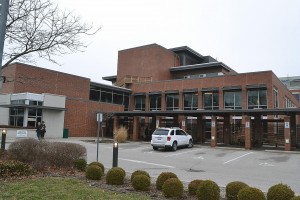The ‘Jolie effect’ on cancer screenings

The Windsor Regional Cancer Centre on Kildare Road on Wednesday April 9, 2015. (PHOTO BY/Allanah Wills)
By Allanah Wills
Health care officials in Windsor are seeing a spike in cancer screenings and it is being attributed to Angelina Jolie.
The 39-year-old American actress and U.N. ambassador made the decision late last month to have her ovaries and fallopian tubes removed. She made the choice after testing showed she carried BRCA1, a gene mutation that greatly increases the risk of developing ovarian cancer. The preventative surgery will place her into menopause and comes in addition to her 2013 double mastectomy.
“We all have BRCA1 genes, they serve an important role in certain tissues of our bodies. In these tissues, the BRCA1 gene produce proteins known as ‘tumour suppressors,’” said Veronica Bryksa, the genetic counsellor at Windsor Regional Cancer Centre. “People who have ‘mutations’ in their BRCA1 genes have an alteration in the genetic sequence that the body uses to produce the tumour suppressors and hence the tumour suppressors do not function at an optimal level.”
Jolie admitted to having the surgery in a New York Times op-ed piece, saying she wanted other women at risk to know about their options. The health promotion co-ordinator at the cancer centre, Amanda Clarke, said she believes it is great for a celebrity like Jolie to talk about their experiences.
“Jolie sheds a light on cancer screenings in general and the importance of women’s informed choice,” said Clarke. “By bringing attention to this, other women start to reflect and think about their family history and if they’re at risk for that gene as well.”
Jolie’s family history and risk of developing cancer is higher than that of an average person. She lost her mother, aunt and grandmother to cancer and, with the BRCA1 mutation, has a 50 per cent chance of developing ovarian cancer compared to the 1.4 per cent chance of a woman without it.
“Most people undertake testing because if they know they are at high risk for certain cancers. We are able to provide surgical recommendations or medical surveillance to help find the cancers early, or help reduce the likelihood it will occur in the first place,” said Bryksa.
Many hospitals across Canada have dubbed it the “Jolie effect,” causing almost double the number of women to participate in genetic testing. According to Bryksa, the cancer centre in Windsor has also seen a spike.
“When Angeline Jolie first came forward with her news about having undergone a mastectomy in May 2013, we did indeed see an increase in referral volumes, so I anticipate a similar pattern will reveal itself this time around.”
Although Jolie’s announcement sheds light on the importance of cancer screenings, she wants women to know there are other alternatives to surgery.
“A positive BRCA test does not mean a leap to surgery,” Jolie wrote in her op-ed piece. “There are other options. It is possible to take control and tackle head on, any health issue.”
Even with the increase in screenings, Bryksa warns people to be cautious when reading about Jolie’s rare cancer journey.
“It is important for people with media exposure to share their experiences because it helps increase awareness about hereditary cancer. Conversely, many people may see the story and jump to conclusions about their own surgical options and their own risks,” said Bryksa. “I think that it is a large responsibility for celebrities, as well as medical providers, to ensure that there is accurate information being provided to patients regarding this issue.”
And according to Clarke, “Angelina Jolie is just one individual in a much larger group of women.”
More information about genetic testing and cancer screening in Windsor can be found at www.wrcc.on.ca, or by calling 519-253-5253.


